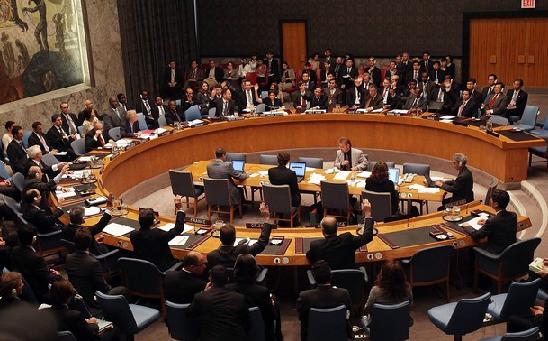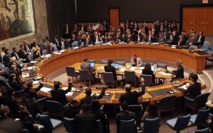Arab ambassadors endorsed the text, which contains new provisions on declaring East Jerusalem the capital of a Palestinian state, settling the issue of Palestinian prisoner releases and halting Jewish settlements.
Security Council member Jordan submitted the text to the other council members, but no decision on the timing for a vote was taken.
"Both our leaderships will be discussing, to find the best way and the best timing to vote on the Security Council resolution," Jordanian Ambassador Dina Kawar told reporters.
Palestinian envoy Riyad Mansour said the vote could "realistically" take place Tuesday.
The draft resolution was formally presented to the council on December 17, but the United States quickly rejected the text over Palestinian insistence that deadlines be set.
The Palestinians had said they were open to negotiations on the text and Jordan began talks on a measure that could garner a consensus among the 15 council members.
But the latest push showed that prospects for a resolution that would satisfy both the Palestinians and the United States were bleak.
Discussions on the draft resolution come amid mounting international alarm over the ongoing violence and the failure to restart negotiations.
Israeli troops shot dead a 17-year-old Palestinian boy in the occupied West Bank during a stone-throwing incident Monday near the northern city of Nablus, sources on both sides said.
- US opposes resolution -
US Secretary of State John Kerry spoke to Palestinian leader Mahmud Abbas on Sunday about the latest Palestinian push at the United Nations.
"We don't think this resolution is constructive," said Jeff Rathke, a State Department spokesman. "We don't believe this resolution... advances the goal of a two-state solution."
The new resolution seen by AFP contains eight amendments, including a new provision recalling that Israel's West Bank barrier was declared illegal and demanding an end to Israeli settlement construction in the Palestinian territories and East Jerusalem.
It remained unclear if the Palestinians would seek a quick vote or hold off until January 1, when five new members with a pro-Palestinian stance join the Security Council.
Diplomats said it was unlikely that the resolution would garner nine votes under the current makeup of the council -- a scenario that would allow the United States to avoid resorting to its veto power.
A US veto risks angering key Arab allies, including partners in the US-led coalition carrying out air strikes against the Islamic State group in Syria and Iraq.
Angola, Malaysia, New Zealand, Spain and Venezuela begin their two-year stint at the council on January 1, replacing Argentina, Australia, Luxembourg, Rwanda and South Korea.
Several European parliaments have adopted non-binding motions calling for recognition of Palestine and there are fears of a return to war unless peace efforts are revived.
The Palestinians have warned that if the bid to win support for a UN resolution fails, they are prepared to join the International Criminal Court to file suits against Israel.
They will also take action at the UN General Assembly and in other international fora to force the issue of Palestinian statehood on the agenda.
"If the Arab-Palestinian initiative submitted to the Security Council to put an end to occupation doesn't pass, we will be forced to take the necessary political and legal decisions," Abbas said last week.
"If it fails, we will no longer deal with the Israeli government, which will then be forced to assume its responsibilities as an occupier."
--------------------------------------------------------------------------------------------------------------------
Security Council member Jordan submitted the text to the other council members, but no decision on the timing for a vote was taken.
"Both our leaderships will be discussing, to find the best way and the best timing to vote on the Security Council resolution," Jordanian Ambassador Dina Kawar told reporters.
Palestinian envoy Riyad Mansour said the vote could "realistically" take place Tuesday.
The draft resolution was formally presented to the council on December 17, but the United States quickly rejected the text over Palestinian insistence that deadlines be set.
The Palestinians had said they were open to negotiations on the text and Jordan began talks on a measure that could garner a consensus among the 15 council members.
But the latest push showed that prospects for a resolution that would satisfy both the Palestinians and the United States were bleak.
Discussions on the draft resolution come amid mounting international alarm over the ongoing violence and the failure to restart negotiations.
Israeli troops shot dead a 17-year-old Palestinian boy in the occupied West Bank during a stone-throwing incident Monday near the northern city of Nablus, sources on both sides said.
- US opposes resolution -
US Secretary of State John Kerry spoke to Palestinian leader Mahmud Abbas on Sunday about the latest Palestinian push at the United Nations.
"We don't think this resolution is constructive," said Jeff Rathke, a State Department spokesman. "We don't believe this resolution... advances the goal of a two-state solution."
The new resolution seen by AFP contains eight amendments, including a new provision recalling that Israel's West Bank barrier was declared illegal and demanding an end to Israeli settlement construction in the Palestinian territories and East Jerusalem.
It remained unclear if the Palestinians would seek a quick vote or hold off until January 1, when five new members with a pro-Palestinian stance join the Security Council.
Diplomats said it was unlikely that the resolution would garner nine votes under the current makeup of the council -- a scenario that would allow the United States to avoid resorting to its veto power.
A US veto risks angering key Arab allies, including partners in the US-led coalition carrying out air strikes against the Islamic State group in Syria and Iraq.
Angola, Malaysia, New Zealand, Spain and Venezuela begin their two-year stint at the council on January 1, replacing Argentina, Australia, Luxembourg, Rwanda and South Korea.
Several European parliaments have adopted non-binding motions calling for recognition of Palestine and there are fears of a return to war unless peace efforts are revived.
The Palestinians have warned that if the bid to win support for a UN resolution fails, they are prepared to join the International Criminal Court to file suits against Israel.
They will also take action at the UN General Assembly and in other international fora to force the issue of Palestinian statehood on the agenda.
"If the Arab-Palestinian initiative submitted to the Security Council to put an end to occupation doesn't pass, we will be forced to take the necessary political and legal decisions," Abbas said last week.
"If it fails, we will no longer deal with the Israeli government, which will then be forced to assume its responsibilities as an occupier."
--------------------------------------------------------------------------------------------------------------------









 Home
Home Politics
Politics











